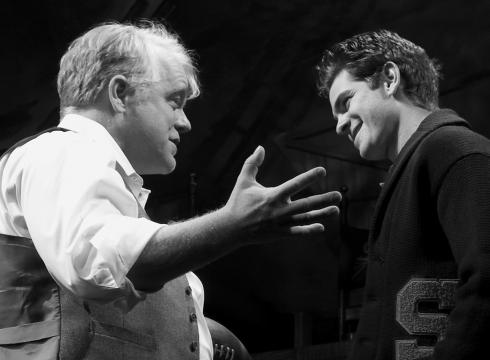In a room sit three great men, a king, a priest, and a rich man with his gold. Between them stands a sellsword, a little man of common birth and no great mind. Each of the great ones bids him slay the other two. Who should he kill?
Therein lies GRRM's meditation on the nature and meaning of power. What is power? What is dominance and submission? And why?
The best I can come up with at this time, after reading and obsessing over A Song of Ice and Fire for over a whole year and am a little fed up with my addiction by now, is this:
Power is one person getting another person to do his bidding.
Simple, isn't it? Yet so complex.
In the end, one person is just one person. He may be a big person with terrifying power who can kill you if you do not obey, like Gregor Clegane (aka, the Mountain that Rides). He may be a vastly rich person who can pay someone to enforce his will, like Tyrwin Lannister. There are various ways to make one person do another one's bidding, with force, with incentives, with fear, with faith, with love, friendship, loyalty, or any other psychological devices. The entire human history is a display of these tricks. Nowadays they call it "leadership."
"Power resides where men believe it resides. No more and no less."
“So power is a mummer’s trick?”
“A shadow on the wall,” Varys murmured, “yet shadows can kill. And ofttimes a very small man can cast a very large shadow.”
(People almost always interpret the "very small man" Varys refers to as Tyrion Lannister, but that is not completely true. He could also mean Joffrey Baratheon.)
But a man is a man, and Valar Morghulis --- All men die, or "Anyone can be killed." When a person says, "Fuck you, I'm out of here," or when a group of people say, "Fuck you, we refuse," how is one man to stop them from walking off?
GRRM's meditation about power and submission can be traced back to his southern vampire novel "Fevre Dream," which is ultimately about slavery, both in terms of the actual slavery in the South and the mental slavery that is an integral part of the human experience. Everyone submits to someone or something in life. There is no escaping it. And submission --- doing another one's bidding --- is neither good nor bad in itself. But he is exploring how and why the system of dominance and submission works between people. Humans are both social animals who rely on their tribe/pack to survive and self-conscious animals with a sense of individual, creating the contradictions in our social life.
Again, I have the eerie feeling that GRRM is so incredibly not American in the head.
There is no answer to Varys' riddle, and there is no answer to GRRM's musing over power and free will. One of the most telling options he proposed lies in Book 4 in the series, "A Feast for Crows." In Braavos lived a secret society of "Faceless Men," which was established by escaped slaves from Valyrian mines. They gave the gift of death. The mission of Faceless Men, in addition to assassinate for pay, was to give the gift to people who beg for it. Indeed it is a mercy and a gift for many, especially for slaves.
The idea is more clearly expressed in Book 5, "A Dance With Dragons." When Tyrion Lannister became a slave in Astapor and later Myreen, he pondered that even in slavery one has a choice --- the choice is death. He chose to live and be enslaved, because death is so ... final. But, still, the point is, one always has a choice.
So, then, GRRM is indeed American after all.






